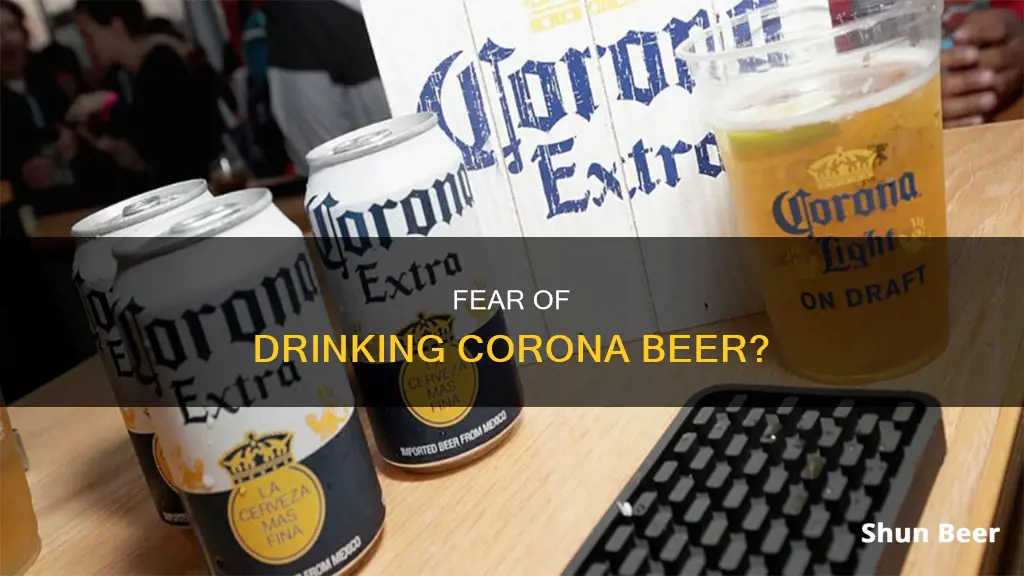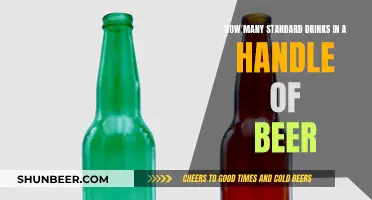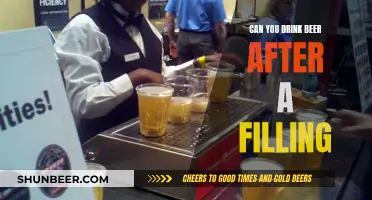
The COVID-19 pandemic sparked fears of a boycott of Corona beer, with some people mistakenly associating the brand name with the virus. A survey conducted by 5WPR found that 38% of beer-drinking Americans said they wouldn't buy Corona, while 14% of Corona drinkers admitted they wouldn't order the brand in public. However, only 4% of Corona drinkers said they would refrain from buying it. This raises questions about whether consumer attitudes towards the brand were truly affected by the pandemic.
| Characteristics | Values |
|---|---|
| Percentage of beer-drinking Americans who wouldn't buy Corona | 38% |
| Percentage of Corona drinkers who would stop drinking it | 4% |
| Percentage of Corona drinkers who wouldn't order it in a public venue | 14% |
| Percentage of beer drinkers who were confused about whether Corona beer is related to the coronavirus | 16% |
| Corona's "buzz score" | 51 |
What You'll Learn
- A survey found that 38% of beer-drinking Americans said they wouldn't order Corona
- Corona's buzz score fell from 75 to 51 in early 2020
- The beer's parent company said it had no plans to change its marketing strategy
- % of beer drinkers were confused about whether Corona beer is related to coronavirus
- Constellation Brands reported an uptick in sales of Corona Extra in the US

A survey found that 38% of beer-drinking Americans said they wouldn't order Corona
A survey conducted by 5W Public Relations found that 38% of beer-drinking Americans said they would not buy Corona "under any circumstances". The survey, which polled 737 beer drinkers in the United States, was conducted amid the ongoing havoc of the coronavirus pandemic. The deadly virus, which had no connection to the Mexican beer brand, drew attention on social media and caused a spike in internet searches for "corona beer virus" and "beer coronavirus". This suggests that some people mistakenly associated the two, despite the alcoholic beverage having no relation to the virus.
The survey also found that 14% of regular Corona consumers admitted they wouldn't order it in public, while 16% were unsure if it had any connection to the virus. These findings led Ronn Torossian, the CEO of 5WPR, to state that "there is no question that Corona beer is suffering because of the coronavirus". He pointed out the challenge for the brand in having the same name as the virus, even though they are not linked, and predicted a major blow for Corona sales. Torossian commented, "After all, what brand wants to be linked to a virus which is killing people worldwide?".
However, it is important to note that the survey questions may have influenced the respondents' answers. The questions did not explicitly mention the coronavirus as a reason for not consuming Corona beer, and there could be other reasons for drinkers' reluctance to purchase it. In fact, only 4% of regular Corona drinkers said they would refrain from buying it, raising questions about the actual impact of the virus on consumer attitudes towards the brand.
Another survey by YouGov, a market research firm, supported the idea that the brand was facing negative associations. Corona's "buzz score", a measure of whether adults have heard positive or negative things about the brand, fell to a two-year low. This indicated a decline in consumer sentiment towards Corona beer, which was ranked as the third-most popular imported beer in the US.
Beer and Cyrios: What You Need to Know
You may want to see also

Corona's buzz score fell from 75 to 51 in early 2020
In early 2020, as the coronavirus was spreading across the globe, the beer brand Corona saw its buzz score fall from 75 to 51. This score, measured by the market research company YouGov, is an online gauge of whether adults who are familiar with the brand have heard anything positive or negative about it. The decrease in Corona's buzz score can likely be attributed to the emergence of COVID-19, as the brand name "Corona" became inadvertently associated with the virus.
According to SEMrush, a trends data provider, there was a notable increase in internet searches for "corona beer virus" and "beer coronavirus" during this time. This suggests that some people mistakenly linked the beer brand with the virus, despite there being no connection between the two. This association may have contributed to the decline in Corona's buzz score, as people may have had negative perceptions of the brand due to the negative connotations of the word "corona".
The impact of the coronavirus on Corona's brand perception is further supported by a survey conducted by the PR agency 5W Public Relations. The survey found that 38% of beer-drinking Americans said they would not buy Corona under any circumstances, with some specifically mentioning the coronavirus as a reason for their reluctance. However, among regular Corona drinkers, only 4% said they would refrain from purchasing it, and 14% said they wouldn't order it in a public place.
Despite the decrease in buzz score and the negative perceptions associated with the brand, Corona's sales remained strong during the early months of the pandemic. In fact, according to research by Yuqing Zheng, Lingxiao Wang, Shuoli Zhao, and Wuyang Hu, Corona's sales increased as COVID-19 cases rose. Each new positive case led to a $5.30 increase in weekly Corona beer sales compared to other major beer brands. This phenomenon may be attributed to brand loyalty, increased brand exposure and promotion on social media, and the accidental publicity that came with the shared name.
Beer, Guns, and Georgia Laws: What's Allowed?
You may want to see also

The beer's parent company said it had no plans to change its marketing strategy
Despite the backlash, Corona Beer's parent company, Constellation Brands, has stated that it has no plans to change its marketing strategy. The company has received criticism for its new hard seltzer product, which is being promoted with the ad campaign "Coming ashore soon". However, they maintain that their customers understand that there is no link between the virus and their business.
In late January 2020, a spokesperson for Constellation Brands emailed CBS MoneyWatch, stating:
> We believe that consumers, by and large, understand there's no linkage between the virus and our beer/business.
This statement was echoed by Maggie Bowman, the senior director of communications for the beer division at Constellation Brands, who said:
> Corona sales continue to be strong. There's misinformation being shared that doesn't match consumer behavior. By and large, our consumers understand there's no linkage between the virus and our beer business.
Despite the negative publicity and consumer confusion, Constellation Brands has reported an uptick in sales of Corona Extra in the US. In a statement, the company said:
> Sales of Corona remain very strong and we appreciate the continued support from our fans. Our advertising with Corona is consistent with the campaign we have been running for the last 30 years and is based on strong consumer sentiment.
Constellation Brands also stated that all units supporting its beer business are seeing positive sales trends for the brand thus far in 2020, despite claims about the impact of the coronavirus on its business.
Should Labradors Drink Beer? A Pet Owner's Guide
You may want to see also

16% of beer drinkers were confused about whether Corona beer is related to coronavirus
In early 2020, the world was in the grip of a fast-moving and deadly pandemic: COVID-19. Originating in China, the virus was causing global concern, and people were understandably anxious. In this context, a survey conducted by 5W Public Relations found that 16% of beer drinkers were confused about whether Corona beer is related to the coronavirus. The survey, which polled 737 American beer drinkers, also found that 38% of respondents said they wouldn't buy Corona "under any circumstances" at that time.
The survey results sparked a flurry of media stories, with some outlets claiming that consumers were avoiding Corona beer due to a perceived link with the coronavirus. However, this interpretation of the survey results was misleading. While it's true that some respondents may have made a connection between the beer and the virus, the survey questions did not explicitly explore this link. The survey also found that only 4% of regular Corona drinkers said they would refrain from purchasing it, and 14% said they wouldn't order it in a public place.
The controversy surrounding the survey highlights the challenges of interpreting data and the potential for media outlets to sensationalise stories. It's worth noting that, at the time, Corona's producer, Constellation Brands, reported strong sales for the Corona Extra brand in the US, with a 5% sales growth in the previous four weeks. This suggests that, despite the survey results, consumer behaviour towards the brand may not have been significantly impacted by the emergence of the coronavirus.
The situation also underscores the delicate balance between a brand's reputation and consumer perception during a public health crisis. While the similarity in names between the beer and the virus may have caused initial confusion, it's important to emphasise that there is no connection between the two.
Tooth Extraction and Non-Alcoholic Beer: What's Safe?
You may want to see also

Constellation Brands reported an uptick in sales of Corona Extra in the US
In early 2020, as the COVID-19 pandemic began to spread across the globe, many Western news outlets reported that consumers were avoiding Corona beer due to its name being similar to coronavirus. However, despite these claims, Constellation Brands, the producer of Corona, reported an increase in sales of Corona Extra in the US.
In a statement, Constellation Brands refuted the idea that consumers were confusing the beer with the virus, stating that their customers "understand there is no link between the virus and our business". A spokesperson for the company, Stephanie McGuane, reiterated this, saying that "sales of Corona remain very strong and we appreciate the continued support from our fans". McGuane also noted that their advertising campaigns were consistent with those of previous years and were based on strong consumer sentiment.
The uptick in sales of Corona Extra in the US was significant, with a 5% growth in the United States in the four weeks ending February 16, 2020. This increase nearly doubled the trend of the past 52 weeks, showcasing the brand's resilience and strong consumer base.
Despite the overall positive sales trends, there were some indications that a portion of consumers may have been hesitant to purchase Corona beer due to the name similarity. A survey conducted by 5W Public Relations found that 38% of American beer drinkers said they wouldn't buy Corona "under any circumstances" at that time. However, among regular Corona drinkers, only 4% said they would refrain from purchasing it. Additionally, 14% of Corona drinkers admitted they would not order the brand in a public place, and 16% were confused about whether Corona beer was related to the coronavirus.
While the survey results suggested some impact on consumer behaviour, Constellation Brands maintained that their sales remained strong. The company's confidence in the brand and its marketing strategies, combined with the strong sales numbers for Corona Extra in the US, demonstrated their ability to navigate through any potential negative perceptions.
Drinking Beer in Public: Singapore's Laws and You
You may want to see also
Frequently asked questions
No, Corona beer is not related to the coronavirus. The beer originated in 1925, forty years before the first strain of coronavirus was discovered and named.
Yes, according to a survey by 5WPR, 38% of beer-drinking Americans said they wouldn't order a Corona. However, among regular Corona drinkers, only 4% said they would now refrain.
Yes, according to a poll by YouGov, Corona's "buzz score" decreased from 75 at the start of the year to 51 by late February. However, the poll did not document any actual decrease in Corona sales due to consumer confusion over a link between the beer and the virus.
No, Corona's parent company said it had no plans to alter its marketing strategy.
People can avoid confusion by refraining from making jokes about Corona beer being related to the coronavirus. Additionally, the virus is now officially referred to as COVID-19, which helps distinguish it from the beer.







